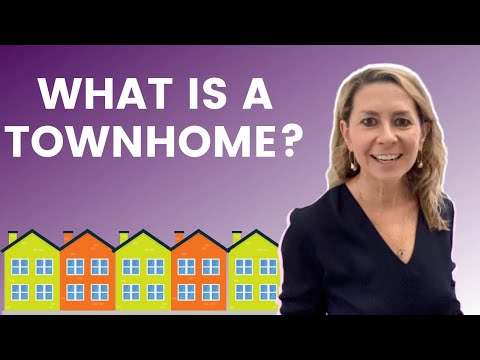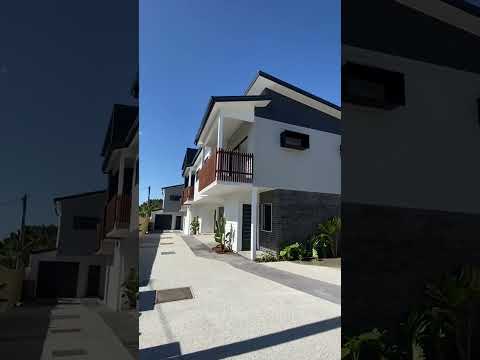Whats a Townhouse? An In-Depth Look into Understanding Its Concept
Wondering about the answer to “whats a townhouse?” Stick around because you’re about to dive into the core definition, structure, and comparisons with other property types.
The Core Definition of a Townhouse
A townhouse, commonly referred to as a townhome, should not be taken literally as “a house in a town.” Technically it’s a city dwelling, often multi-floor, sharing one or two walls with adjacent properties. Each unit has its direct entrance and often, a small front and backyard. Neat, isn’t that?
Comparing the Structure of a Townhouse vs. Single-Family Home
Perhaps the most obvious difference between a townhouse vs. single-family home is the structure. If you’re new to the house Vs Townhouse debate, here’s a quick gist. Single-family homes are freestanding, usually housed with their land, giving them garden space. In contrast, townhouses are attached to one another and have at least one shared wall with adjacent townhomes.
Townhouse Definition vs. a City Dwelling: Identifying Similarities and Differences
It’s crucial to understand that although every townhouse can be deemed a city dwelling, not every city dwelling can be classed as a townhouse. This is important as you explore “whats a townhouse” in your property search. So remember, the townhouse is a city dweller with specific characteristics.

The Main Highlights of a Townhouse: 7 Amazing Benefits to Consider in 2024
All right, let’s dive into the meat of the article. The benefits of townhouse living. Here are seven incredible reasons you should consider a townhouse in 2024.

Benefit 1: Architectural Design and Space Efficiency
Most townhouses have a uniform look and design, usually boasting two or more floors. This gives residents a sense of belonging, as their home blends seamlessly into the community aesthetic.
Benefit 2: Affordability Compared to Other Residential Property Types
When you explore the difference between condo And Townhouse, you’ll find that townhouses are more affordable. This affordability extends to other residential property types, making townhouses a smart choice.
Benefit 3: The Community Aspect of Living in a Townhouse
Townhouses are fantastic for fostering a sense of community. Think of it as a more intimate version of city life – all your neighbors are within an arm’s reach, and you might even make some lifelong friends.
Benefit 4: Lower Maintenance Responsibility and Costs
Another perk of living in a townhouse is you’re not solely responsible for maintenance. Yes, you heard that right! There might be homeowner association that often covers the external structure and commons areas, reducing your personal maintenance stress and costs.
Benefit 5: Increased Security Measures
Considering the dense structure of townhouses, they naturally offer better security than separate houses. Neighbors are more likely to look out for each other, making your townhouse safer.
Benefit 6: Variety in Location Possibilities
Whether you’re in the 512 area code or browsing Craigslist orange county, townhouses offer a variety of location possibilities. From bustling urban areas to quiet suburban pockets, townhouses come in many shapes, sizes, and locations.
Benefit 7: Potential Investment Opportunities
Considering the popularity and affordability of townhouses, they present fantastic investment opportunities. Whether you want to rent out the space or sell after some value-adding refurbishments, the options are plentiful.

| Subject | Description |
|---|---|
| Definition of a Townhouse | A townhouse is a multi-level, city dwelling that shares one or two walls with adjacent properties. Sometimes it’s also referred to as a townhome. It is not a freestanding structure and often sports a uniform look with other adjacent units. |
| Structure of a Townhouse | Townhouses tend to consist of two or more floors, with each unit having their own separate entrance, often with a small front lawn and a backyard. They share at least one wall with their neighboring units. |
| Difference from a Single-Family Home | Unlike townhouses, single-family homes are freestanding structures, typically situated on their own plot of land. Single-family homes do not share any walls with adjacent properties. People may also refer to these homes as single-detached houses or standalone houses. |
| Difference from an Apartment | While an apartment is a unit within a larger building housing a community under the same roof, a townhouse is a free-standing unit that gives the feel of a traditional house. Even though townhouses share one or more walls with other units, each unit maintains its own individuality. |
| Pros of a Townhouse | Townhouses tend to be less expensive than single-family homes and often include maintenance, thus providing a potentially more affordable and convenient living situation. They also offer residents their own private entrance and possibly small outdoor spaces. |
| Cons of a Townhouse | Since townhouses share walls with other units, owners may experience much less privacy when compared to a single-family home. The uniform look might not appeal to those who seek uniqueness and the multi-level design could pose challenges for people who have mobility issues. |
Defining Key Differences: What is a Town House versus an Apartment?
You’ve explored “whats a townhouse,” but how does it differ from an apartment? Well, let’s delve in.
Structural Management and Organization
The main difference between a townhouse and an apartment is in its structural management and organization. Townhouses are free-standing and give the impression of being a traditional house. An apartment is a unit in a larger building that encompasses a community all inside the same walls.
Impressions of a Traditional House vs. Apartment Living
Ever thought of the difference between apartment And condo? Or pondered the Types Of Apartments? A townhouse is a mixed bag offering the best of both worlds. You get the feel of traditional housing with the convenience and community of apartment living.
The Impact of Shared Walls and Surrounding Community
Living in a townhouse means you’re sharing walls, which can be a pro or a con, depending on your lifestyle and preferences. This shared living also impacts the community around you.

The Intricacies of a Townhome: Its Unique Features and Aspects
Understanding “whats a townhouse” involves diving into its unique features, aspects, and their implications.
The Standard Look and Design of a Townhome
Townhomes generally sport a uniform look and design, often consisting of two or more floors.
The Common Features Found in a Townhouse
Aside from the shared walls and community living aspect, a townhouse often boasts spacious interiors, private entrances, and outdoor spaces.
Understanding the Shared Walls Concept
Living in a townhome means understanding you’ll share walls with neighbors. However, shared walls don’t mean shared privacy!

Deciphering the Home Nomenclature: Is there a Difference between “what is a Townhome” and a Standalone House?
Time to explore the key differences between a townhome and a standalone house. Boring lingo? Maybe. But trust me, it’s worth knowing.
The Characteristics of a Standalone House
A standalone house, also known as a detached house, does not share any walls. Being typically situated on its plot, it offers more privacy but comes with a heftier price tag.
Investigating the Structural Aspects of a Townhome: What Makes it Unique?
In contrast, a townhome is a residential building sharing one or more walls with other similar units. They sport a uniform look and design, and consist of two or more floors.
Townhouse or Traditional Homes: The Pros and Cons
So, house Vs condo, what’s the final verdict? The decision between a townhouse or traditional homes primarily depends on your lifestyle, community preferences, and budget considerations.

A Creative Epilogue: Wrapping Up the Townhouse Conversation
After such an in-depth look into the world of townhomes, here are some key takeaways you should consider.
The Potential Future of Townhouses in Residential Housing
Townhouses are an excellent “middle-ground” solution that balances affordability, convenience, and homeowner rights, suggesting a strong future in residential housing.
Key Takeaways About the Townhouse Landscape in 2024
From their affordability to potential investment opportunities, there are several reasons why townhouses are a lucrative choice for homeowners in 2024.
Final Thoughts: Is a Townhouse the Right Match for You?
So, if you’ve been pondering “whats a townhouse,” you should now have a clearer picture. Whether a townhouse is right for you hinges on your lifestyle, preferences, and financial circumstances. So go on and explore, who knows, your dream home might be a townhome after all!
What is difference between townhouse and house?
Well, the key difference between a townhouse and a house lies in their structure and ownership. Generally speaking, a townhouse is a narrow, multi-story property, architecturally joined to neighboring properties. You own the interior and exterior of a townhouse, including your backyard. On the other hand, a standalone house may offer more freedom, as it is separately built and comes with a yard, front and back, typically.
What makes a property a townhouse?
What makes a property a townhouse? Good question! Essentially, a townhouse is a style of housing where each unit is individually owned, but the buildings are joined by shared walls. They’re multi-story homes and have a smaller footprint than standalone homes, often making them a good fit for urban areas.
What makes a townhouse different from an apartment?
Oh boy, the difference between a townhouse and an apartment! While an apartment is generally part of a larger residential building owned by a single entity, a townhouse is typically a self-contained, multi-story unit that’s individually owned. You buy a townhouse, but you usually rent an apartment. Easy peasy!
What does it mean to live in a townhouse?
Living in a townhouse means enjoying the best of both worlds – the perks of home ownership and the convenience of communal living. The residents own their individual units from walls inward and share common areas like the gym, pool, or park. Plus, say goodbye to shoveling snow or mowing the lawn!
What are the disadvantages of a townhouse?
One glaring disadvantage of living in a townhouse could be the close proximity to neighbors. Just picture this, Barry, your neighbor, could be playing his trombone at midnight! Plus, you may bump heads with Homeowners Association (HOA) rules, like Barry’s choice of a neon pink door.
Why do they call it a townhouse?
Why do they call it a townhouse, you ask? Historically, a ‘townhouse’ was the city dwelling of a wealthy or noble family, used during their visits to the town for social or political reasons. It stuck over time, but today’s townhouses aren’t just for nobility—it’s all about the interconnected living style.
What are the pros and cons of buying a townhouse?
Weighing the pros and cons of buying a townhouse? Here’s the scoop! Pros include affordability, shared maintenance, and community amenities. As for the cons, HOA fees, less privacy, and lesser control over exterior changes are the usual gripes.
What do a townhouse look like?
Picture rows of homes, each mirroring the other, all sweetly nestled together. That’s what most townhouses look like. They are multi-story, often with the living space on the bottom and bedrooms aloft, have a small yard or patio, and are part of a community.
What are the advantages of living in a townhouse?
One upside of living in a townhouse is the sense of community. You know like having neighbors next door to borrow a cup of sugar from. You also get to enjoy shared amenities, no major maintenance burdens, and often, they’re smack in the heart of town.
Are townhomes good rental properties?
As rental properties, townhomes can indeed be a goldmine! They typically offer more space than apartments, pulling in families, and you might collect fees from the HOA. However, remember, you are still on the hook for repairs and maintenance within the unit.
What is the difference between a duplex and a townhouse?
The difference between a duplex and a townhouse comes down to configuration. A duplex is a single building containing two separate living units, while a townhouse is part of a row of similar units. Two peas in a pod, just packaged differently!
Why do people like townhouses?
People tend to like townhouses for their sense of community, easy maintenance, access to amenities, and often, their location in buzzing urban areas. No more lonely nights or mowing lawns!
What are the advantages of a townhouse vs single-family?
Comparing a townhouse vs a single-family home? The advantages of a townhouse are that they’re generally more affordable, require less upkeep, are located in denser urban zones, and offer shared amenities. Yet, you may have less privacy and more rules to follow.
What are the benefits of living in a townhouse?
The benefits of living in a townhouse include lower maintenance hassle as the HOA takes care of the communal area, shared amenities like a pool or gym, the close-knit community vibe, and potentially, a more central urban location.
Why do townhouses cost more than houses?
Why do townhouses cost more than houses? Well, it ain’t just about size, it’s about location too. Townhouses are often located in desirable urban locations, close to amenities, cities, or employment hubs. Such top-notch locations can hike up the price!
Are townhouses bigger than houses?
Are townhouses bigger than houses? Not necessarily, my friend. Townhouses are typically smaller in footprint compared to standalone houses, but they can make up for it with multiple stories. It really depends on the specific properties in question.
What is the difference between a townhome and a single family attached home?
The difference between a townhome and a single-family attached home? It’s practically one and the same. Both terms refer to individually owned units within a multi-unit property. Perhaps the only little twist is that a ‘single-family attached home’ can also refer to duplexes or triplexes.



